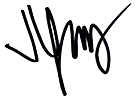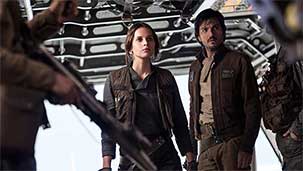Among the many characteristics that distinguish Rogue One: A Star Wars Story as a heretical chapter in the hallowed space opera franchise, the most significant might be the fact that this is the first ever Star Wars film that isn’t scored by John Williams.
While the previous seven motion pictures vary greatly in both technique and disposition, Williams’ music was the common element that consolidated them. Whatever you thought of the quality of those films, the quality of the music in them was inarguably magnificent. Even Attack of the Clones – which is, by most rational standards, the very worst of them all – features one of the franchise’s best pieces of music, “Across The Stars,” a Vivaldi-like minuet that swoons and swells and elicits all those feelings of doomed romance that the actors and screenwriters couldn’t quite manage.
Williams’ uncanny knack for composing melodic themes and leitmotifs, then incorporating them seamlessly into larger pieces of music, feels increasingly like a lost art. Hans Zimmer is the new figurehead of movie music, and his (sometimes very moving) electronic soundscapes have defined how modern blockbusters are scored. You’re one of the exceptions to that rule; a composer in the classical sense. The aesthetic approach you represent is diametrically opposed to Zimmer’s; you’re the Larry Bird to his Magic Johnson; the Mario Lemieux to his Wayne Gretzky. And with this film you have the perfect opportunity to prove what movie music is supposed to be all about.
But that wasn't the mission of Rogue One, was it?
This is a Star Wars film that isn’t really a Star Wars film. It takes place in the Star Wars universe, sure, and features sets and props and even characters from the other films. But it’s not a swashbuckling adventure movie. It’s not even a goofy mercantile soap opera, like the prequels. It’s a war film. And a grim one, at that. Even when your upbeat swelling score tries to tell us otherwise.
The original Star Wars was a mash-up: a genre film cobbled together from other genre films; science-fiction as western as samurai movie. Rogue One’s progenitors, however, are harder to figure out. It’s certainly a film of it’s time: a beautiful, crammed-tight, monochromatic, self-serious blockbuster. There are elements of a heist flick, too. And much of the second act, with soldiers creeping through jungle landscapes, feels like a Vietnam War movie (especially the costume design, which favours bulky helmets and sleeveless jackets). But none of it ever comes to fruition. It doesn’t service the story (which never feels quite as urgent as it should) or the characters (who are the least interesting gang of ragtag ne’er-do-wells ever assembled).
I reacted to this film in almost the exact same way I reacted to director Gareth Edwards’ previous big blockbuster, Godzilla. It looks beautiful. There’s something about the scale of his films that feels uniquely epic—even in an era when epic is easy. The lenses he shoots with, the way he composes the frame—it captures the bigness of big things in a way that many other contemporary filmmakers just don’t seem able. But Rogue One, like Godzilla, suffers the small things. No relationship feels genuine, no motivation seem realistic.
Your score – miraculously composed and recorded only five weeks before the release date, after the original composer, Alexander Desplat, left the production – feels, in isolation, like it makes sense. The strings are there. The big, booming brass. The little flutter of woodwinds. All the pieces are assembled. But in the film it sounds murky and awkward. Maybe because everything around it – the dialogue, the political worldview – is murky and awkward, too.
In this era of gritty, grey blockbusters, the return of the Star Wars franchise promised a return to spectacle and vibrancy. In its music, too. I would have loved to have left the theatre after seeing Rogue One being able to whistle a new melody. But there wasn’t a single note of music in your score that stuck with me. Instead, I left the theatre exhausted and seeking a bit of silence. Rogue One is awesome in scope, yes. But so awesome in scope that one’s sense of awe, about halfway through, is completely obliterated.
Sincerely,

Jared






